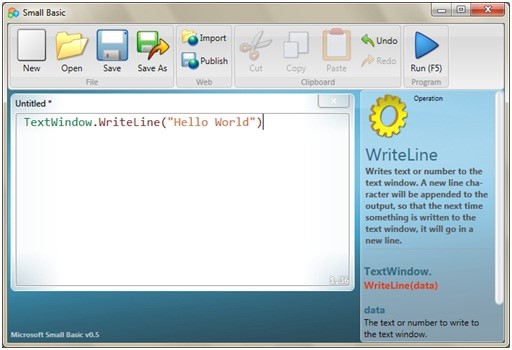As one of the many collaborations we're working on with the Kodu team, they featured me in their Community Spotlight.
Click here to read my interview with the Kodu team
Here are a few of the questions they asked me...
What sort of lessons can students learn in Small Basic?
 You learn the core concepts quickly and easily because you learn them in the simplest environment. BASIC was started in 1964 and stands for Beginner's All-purpose Symbolic Instruction Code. It was created to teach software development. So we've provided a version that's even more simplified and better suited to get you up and running, writing your own code, and understanding core programming concepts, even faster. These core concepts include Variables, Conditions & Branching, Loops, Graphics, Shapes, Subroutines, Arrays, and Events & Interactivity.
You learn the core concepts quickly and easily because you learn them in the simplest environment. BASIC was started in 1964 and stands for Beginner's All-purpose Symbolic Instruction Code. It was created to teach software development. So we've provided a version that's even more simplified and better suited to get you up and running, writing your own code, and understanding core programming concepts, even faster. These core concepts include Variables, Conditions & Branching, Loops, Graphics, Shapes, Subroutines, Arrays, and Events & Interactivity.
Follow one of our tutorials, and you'll likely pick up these concepts much more quickly on your own (and even faster with a mentor helping you) than you would in a classroom, where you might learn the concepts for the first time, in a more complicated language. You'll learn all the foundational building blocks of languages like Visual Basic, C++, C#, and many more.
In your opinion, what’s the coolest thing about Small Basic?
Small Basic was originally designed by Vijaye Raji, and its success is derived from three pillars of value.
First, it's Simple. Small Basic is imperative and doesn't use or expose beginners to concepts like scopes, types, object orientation, etc. The language consists of just 14 keywords. There isn't a type system. You can create string and numeric constants and assign them to variables. Operations performed on these variables will be interpreted according to the content. All variables are global and are always initialized. They can be used before they're assigned! You can create a sub-routine and assign it to an event. The libraries provide static "Objects" that group operations, properties and events. New libraries can be created using other .Net Languages and added to the Small Basic runtime. If you're new to programming, this doesn't sound very simple. A lot of these details are what helps make Small Basic easier to learn and you can read more in the Small Basic FAQ.
Second, it's Social. Share your programs with your friends; let them import your published programs and run them on their computer. You can even post your games on your blogs and websites for them to play your creations in the browser! Check out the Small Basic Program Gallery, listed by category for examples. After you work together in making your game, you can discuss it with the
community in the Small Basic MSDN Forum. And then we might feature it on the Small Basic MSDN Blog.
Third, it's Gradual. Small Basic is based on .NET and what you learn here could be easily applied to other .NET programming languages like Visual Basic. When you do “graduate” to Visual Basic, just click the Graduate button, and you can bring your existing programs with you into Visual Basic via the free Visual Studio Express download. Using this system, you can learn Visual Basic,
C++, and C#, without ever spending a dime.
Thanks to the Kodu team for the interview!
- Ninja Ed